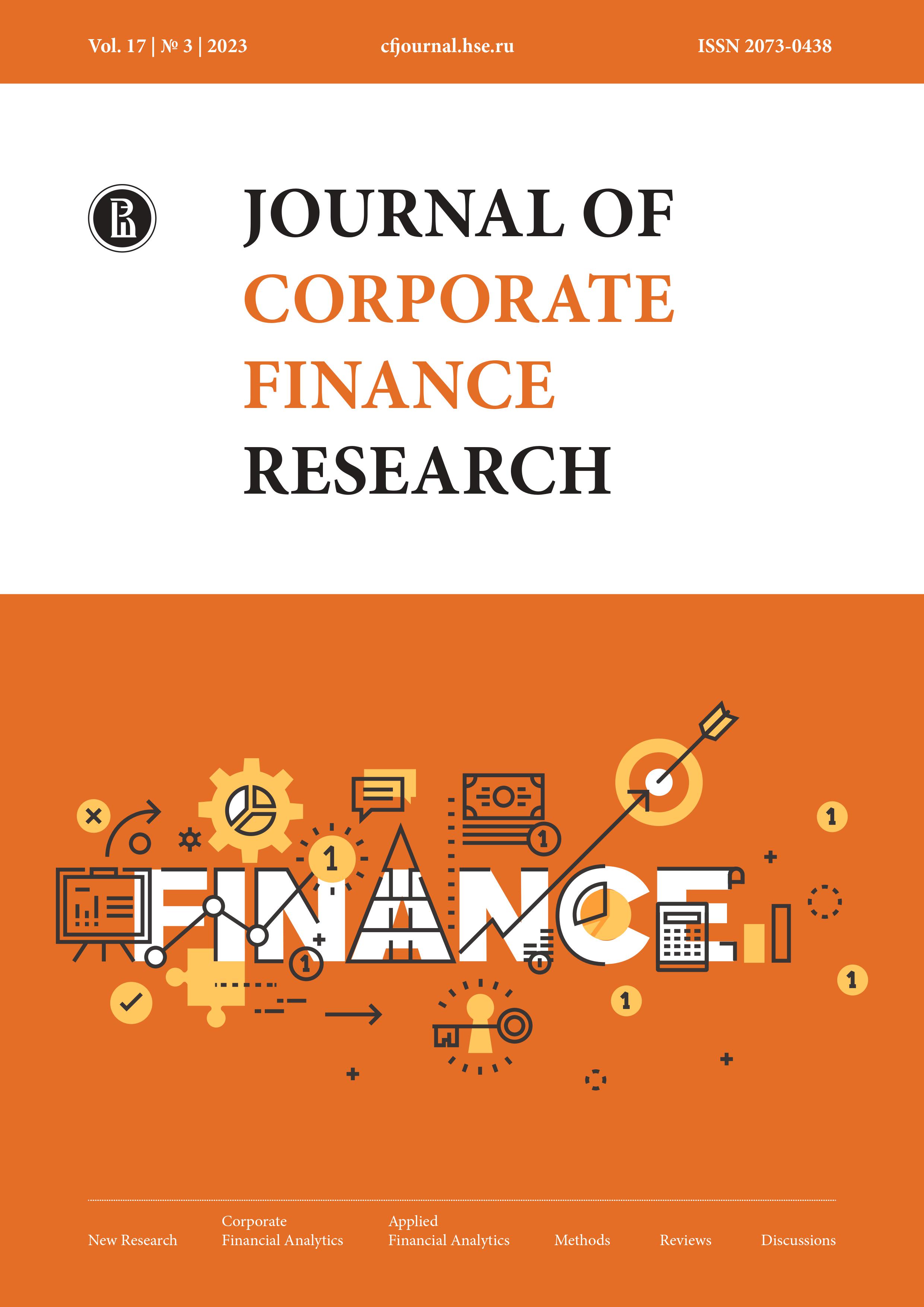Do Inclusive Growth Strategies Affect Corporate Financing Policy? Evidence from The Metal and Mining Sector
Abstract
The influence of inclusive growth strategy on corporate financing policies is examined within the metals and mining industry. A dataset comprises 212 of the largest publicly traded companies observed from 2016 to 2021. An econometric analysis revealed no significant effect of inclusion indicators on the financing policies of these companies. However, a positive association between the corporate resource efficiency and leverage levels was observed. Though no single inclusion indicator influences the volume of sustainable financing, the indicator of human rights compliance positively impacts the number of such financing arrangements. Furthermore, only the levels of emission reduction and the extent of improvement in living standards of local communities significantly influence the cost of capital (with a positive dependence for the former, and a negative dependence for the latter). Inclusion indicators have little impact on the capital structure, with leverage levels largely determined by metals pricing dynamics. Higher levels of inclusion correlate with increased utilization of sustainable financing. The findings can be used when implementing inclusive growth strategies in the metals and mining industry as well as when deciding on the financing of projects within this sector. We believe that analysis of other industries and a longer period of time, different results may be obtained. This is, on the one hand, a limitation of this work, and on the other hand, an area for further research.
Downloads
References
Ali H., Son H.H. Measuring Inclusive Growth. Asian Development Review. 2007;24(1):11-31. https://doi.org/10.1142/S0116110507000024 DOI: https://doi.org/10.1142/S0116110507000024
OECD. All on Board: Making Inclusive Growth Happen. Paris: OECD Publishing; 2015. 200 p. https://doi.org/10.1787/9789264218512-en3.
Eurasian Economic Commission, United Nations Conference on Trade and Development. Inclusive growth of the Eurasian Economic Union Member States: assessments and opportunities. 2019. https://doi.org/10.13140/RG.2.2.30267.36649
Transforming our world: the 2030 Agenda for Sustainable Development. 2015. URL: https://sustainabledevelopment.un.org/content/documents/21252030%20Agenda%20for%20Sustainable%20Development%20web.pdf (accessed on 11.05.2023)
Tamimi B., Sebastianelli R. Transparency among S&P 500 companies: an analysis of ESG disclosure scores. Management Decision. 2017;55(8):1660-1680. https://doi.org/10.1108/MD-01-2017-0018 DOI: https://doi.org/10.1108/MD-01-2017-0018
Arayssi M., Jizi M., Tabaja H.H. The impact of board composition on the level of ESG disclosures in GCC countries. Sustainability Accounting, Management and Policy Journal. 2020;11(1);137-161. https://doi.org/10.1108/SAMPJ-05-2018-0136 DOI: https://doi.org/10.1108/SAMPJ-05-2018-0136
Khaled R., Ali H., Mohamed E.K.A. The Sustainable Development Goals and corporate sustainability performance: Mapping, extent and determinants. Journal of Cleaner Production. 2021;311:127599. https://doi.org/10.1016/j.jclepro.2021.127599 DOI: https://doi.org/10.1016/j.jclepro.2021.127599
Bhattacharya A., Lang N., Hemerling J. Beyond Great: Nine Strategies for Thriving in an Era of Social Tension, Economic Nationalism, and Technological Revolution. PublicAffairs; 2020. 288 p.
Naciti V. Corporate governance and board of directors: The effect of a board composition on firm sustainability performance. Journal of Cleaner Production. 2019;237:117727. https://doi.org/10.1016/j.jclepro.2019.117727 DOI: https://doi.org/10.1016/j.jclepro.2019.117727
Cheng B., Ioannou I., Serafeim G. Corporate social responsibility and access to finance. Strategic Management Journal. 2014;35(1):1–23. https://doi.org/10.1002/smj.2131 DOI: https://doi.org/10.1002/smj.2131
Benlemlih M. Corporate Social Responsibility and Firm Debt Maturity. Journal of Business Ethics. 2017;144:491–517. https://doi.org/10.1007/s10551-015-2856-1 DOI: https://doi.org/10.1007/s10551-015-2856-1
Dimitropoulos P., Koronios K. Corporate Environmental Responsibility and Capital Structure. In: Corporate Environmental Responsibility, Accounting and Corporate Finance in the EU. Springer Nature; 2021. 265 p. https://doi.org/10.1007/978-3-030-72773-4_7 DOI: https://doi.org/10.1007/978-3-030-72773-4
Villaron-Peramato O., Garcia-Sanchez I.M., Martinez-Ferrero J. Capital structure as a control mechanism of a CSR entrenchment strategy. European Business Review. 2018;30(3):340–371. https://doi.org/10.1108/EBR-03-2017-0056 DOI: https://doi.org/10.1108/EBR-03-2017-0056
Al Amosh H., Khatib S.F.A., Alkurdi A., et al. Capital structure decisions and environmental, social and governance performance: insights from Jordan. Journal of Financial Reporting and Accounting. 2022; Ahead-of-print. https://doi.org/10.1108/JFRA-12-2021-0453 DOI: https://doi.org/10.1108/JFRA-12-2021-0453
Lindkvist L., Saric O. Sustainability Performance and Capital Structure: An analysis of the relationship between ESG rating and debt ratio. 2020. URL: https://www.divaportal.org/smash/get/diva2:1447928/FULLTEXT01.pdf (accessed on 11.05.2023)
El Ghoul S., Guedhami O., Kim H., et al. Corporate Environmental Responsibility and the Cost of Capital: International Evidence. Journal of Business Ethics. 2018;149:335–361. https://doi.org/10.1007/s10551-015-3005-6 DOI: https://doi.org/10.1007/s10551-015-3005-6
Gianfrate G., Schoenmaker D., Wasama S. Cost of Capital and Sustainability: A Literature Review. 2018. URL: https://www.rsm.nl/fileadmin/Faculty-Research/Centres/EPSVC/11_04_Cost_of_Capital.pdf (accessed on 11.05.2023)
Goncalves T.C., Dias J., Barros V. Sustainability Performance and the Cost of Capital. International Journal of Financial Studies. 2022;10(3):63. https://doi.org/10.3390/ijfs10030063 DOI: https://doi.org/10.3390/ijfs10030063
Dorfleitner G., Grebler J. The social and environmental drivers of corporate credit ratings: international evidence. Business Research. 2020;13(3):1343–1415. https://doi.org/10.1007/s40685-020-00127-9 DOI: https://doi.org/10.1007/s40685-020-00127-9
Bannier C.E., Bofinger Y., Rock B. Corporate social responsibility and credit risk. Finance Research Letters. 2022;44:102052. https://doi.org/10.1016/j.frl.2021.102052 DOI: https://doi.org/10.1016/j.frl.2021.102052
Li H., Zhang X., Zhao Y. ESG and Firm’s Default Risk. Finance Research Letters. 2022;47(B):102713. https://doi.org/10.1016/j.frl.2022.102713 DOI: https://doi.org/10.1016/j.frl.2022.102713
Copyright (c) 2023 National Research University Higher School of Economics

This work is licensed under a Creative Commons Attribution-NonCommercial-NoDerivatives 4.0 International License.

